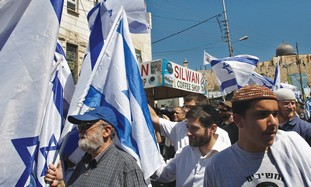
THINK-ISRAEL |
In light of recent incitement by lecturers, it's important to examine the freedom of expression and the "right" of academics to engage in extremist speech.
Two weeks ago it was reported that State Prosecutor Shai Nitzan had asked police to investigate Ben-Gurion University chemistry lecturer Eyal Nir for incitement because of a call he made to "break the necks" of a right-wing fringe group. The same week, Kent State University Professor Julio Pino yelled "death to Israel" during a lecture by Israeli diplomat Ishmael Khaldi. It is important to examine not only the merits of these cases but also the wider context of freedom of expression and the "right" of academics to engage in extremist speech while at the same time enjoying the presumption that their work with students remains unbiased and uninformed by their sometimes radical views.

The Nir incident took place in June, 2011, after Israelis marched through Jerusalem on Jerusalem Day. Some of the fringe part of the march included a group that chanted anti-Arab slogans and whose comments were posted on YouTube. Nir saw the YouTube video and linked to it on his Facebook page, with a comment in Hebrew that "gangs of bandits are swarming our country. I call on the world to come and help break these scoundrels' necks."
The comment drew criticism and numerous comments on Facebook but Nir stood by what he said. He wrote that the gang in question consisted of a few bullies and that they must be prevented from carrying out their threats.
"I believe my cry to stop them is reasonable," said Nir.
It is worth noting that Eyal Nir is no stranger to radical politics in Israel. In 2010 he was photographed being arrested by the IDF during a protest at Nabi Salah in the West Bank. Blogger Alison Ramer wrote that "Nir was taken into an army jeep for insulting a soldier with a racial slur."
Ben-Gurion University has seemingly stood by Nir, noting in a statement: "Dr. Nir published his comments as a private individual, on his personal Facebook page. The university does not take a side in the matter, and therefore justice should be sought in appropriate legal forum."
Others took issue with the comments immediately, establishing an online petition to have him fired.
THE PROBLEM with Nir's comments is not whether they constitute incitement under Israeli law, since the incitement law is, in my opinion, flawed. The issue that should be raised about Nir's diatribe is how it impacts the university environment he teaches in. A review of cases abroad shows that most faculty members who have been fired for things they said had their jobs terminated only in connection to comments made in class or which were directly related to campus activities.
For instance, a Leeds University lecturer was suspended and took early retirement when he gave an interview to a student newspaper suggesting that Africans were less intelligent than Europeans. There do not seem to be any incidents of faculty members having been fired for statements made outside of the university setting.
However, Peter Van Onselen, writing in The Australian, recalled that a colleague once complained to his university about a column he had written. He took the "view that it brought the university [a previous employer] into disrepute, and requested that I be reprimanded for doing the university's reputation damage," wrote Onselen.
Do Nir's comments bring Ben-Gurion University into disrepute? Considering the fact that the university has no shortage of radical leftists who do not hesitate to offer their opinion that Israel is a colonizing, racist country, it would seem that the university's reputation could not be tangibly changed by these newest comments.
The story of the "death to Israel" comment by Julio Pino, a tenured professor at Kent State, is more nuanced. Pino is a native of Cuba and a convert to Islam. There is some irony in the fact that the visiting Israeli diplomat who drew Pino's ire is himself a Muslim (Mr. Khaldi is Israel's first Beduin deputy consul). His outburst took place on campus. Kent State President Lester Lefton condemned Pino's outburst, however according to the American Association of University Professors, "Calling out a political slogan during a question period falls well within the speech rights of any member of a university community."
Most respected academics know the value of having their students believe classes are not biased against certain individuals due to race, creed or gender. Since national-religious students in Israel clearly constitute a creed it is certainly possible that these students might feel that Nir's "break their necks" comment was directed at them and would feel uncomfortable attending his classes. How can one study in such a hostile environment? Could a black student feel comfortable in a class where she knew that the lecturer had written in an op-ed that black activists should have their necks broken? Furthermore, why do academics enjoy a special type of free speech that no other occupation enjoys?
Those defending these "outbursts" seem to misconstrue the notion of academic freedom, which means freedom to research, with the idea that academics have the right to behave in the lowest manner possible, using outbursts that befit the village drunk more than they do a holder of a doctorate. When an academic's behavior is as savage, unrestrained and brutish as that of someone leaving a pub sloshed at three in the morning, one wonders where our notion of what constitutes acceptable behavior, and speech, went wrong.
Seth Frantzman has a Ph.D. from Hebrew University and is a fellow at
the Jerusalem Institute for Market Studies.
This article appeared in the Jerusalem Post
www.jpost.com/Opinion/Columnists/Article.aspx?id=244853
and is archived in November 2011,
http://journalterraincognita.blogspot.com/